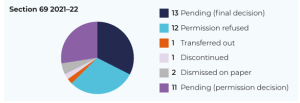The Judiciary of England and Wales has published the Commercial Court Report for the year 2021-2022 (the Report). These reports are released annually to give an overview of the courts’ work and decision-making. For arbitration practitioners, they also provide insight into the number of applications made before the English court to challenge arbitral awards and how these applications are resolved. This year, the Commercial Court has reported a significant increase in arbitration-related applications, reflecting London's continued status as an important centre for international arbitration.
Matters arising from arbitration comprise approximately 25% of the claims issued in the Commercial Court. These claims include applications to challenge arbitral awards, for injunctions in connection with arbitration, for the enforcement of awards and other applications in support of the arbitral process. However, the bulk of the claims relate to challenges to arbitral awards under the Arbitration Act 1996 (the Act) on the grounds of lack of substantive jurisdiction (s67), serious procedural irregularity (s68) and appeals on a point of law (s69). The Report provides a set of statistics for s67, 68 and 69 applications made in the year 2021-2022 and compares these statistics with the previous year. It also provides statistics on injunctions under s44 of the Act.
Number of applications made
The Report confirms a significant increase in challenges under both s67 and s68 of the Act, and a slight increase in challenges under s69. Interestingly, however, there was a material decrease in applications under s44:
| Court Year | S67 | S68 | S69 | S44 |
| 2021-2022 | 27 | 40 | 40 | 15 |
| Previous year (2020-2021) | 17 | 26 | 37 | 27 |
| % increase | 59% | 54% | 8% | (55%) |
Outcome of applications
The Report also indicates the outcome of challenge applications with some granularity, including whether and how an application was dismissed (e.g. on paper or at a hearing). For s69 (appeal on a point of law) applications, it is notable that the majority of claims were either dismissed on the papers or denied permission to proceed:
Similarly:
- For s68 (serious procedural irregularity) applications during the year 2021-2022, 5 applications were dismissed on the papers, 1 was dismissed at a hearing, 2 were discontinued, 1 was transferred out and 31 are pending.
- For s67 (lack of substantive jurisdiction) applications during the year 2021-2022, 5 were dismissed on the papers, 1 was unsuccessful, 1 was discontinued, and 20 remain pending.
As the reporting is conducted on the basis of the year in which the claim was commenced rather than the year that the outcome is known, the success rates for the Court Year 2021-2022 are not yet available. However, and consistent with the graph above, it is clear from the statistics for the previous year (2020-2021) that the success rate for challenges to awards remains very low:
| Court Year | S67 | S68 | S69 |
| 2020-2021 success rate | 6% | 4% | 5% |
Comment
It is noteworthy that there has been a significant increase in challenges under s67 and s68 of the Act, particularly given the introduction of provisions in the Commercial Court Guide aimed at deterring and sanctioning speculative s67 and s68 challenges. However, this may also reflect an increase in the number of London-seated arbitrations more generally. It is nonetheless noteworthy that the success rate for challenges remains low, and this again evidences the robust approach of the English court to ensure the finality of arbitral awards – reflecting that the court shall only overturn the decision of the arbitral tribunal in truly exceptional cases where something has gone very seriously wrong.
As reported in our blogpost here, the Law Commission is currently consulting on the procedure for jurisdictional challenges under s67 of the Act, with the aim of limiting the Court's review of arbitral awards on jurisdiction in order to prevent delay and cost through duplication. To the extent that these changes are adopted in due course, it will be interesting to see the impact on future Commercial Court caseload and statistics.
For further information, please contact Craig Tevendale, Partner, Elizabeth Kantor, Professional Support Lawyer, or your usual Herbert Smith Freehills contact.
Key contacts
Disclaimer
The articles published on this website, current at the dates of publication set out above, are for reference purposes only. They do not constitute legal advice and should not be relied upon as such. Specific legal advice about your specific circumstances should always be sought separately before taking any action.


